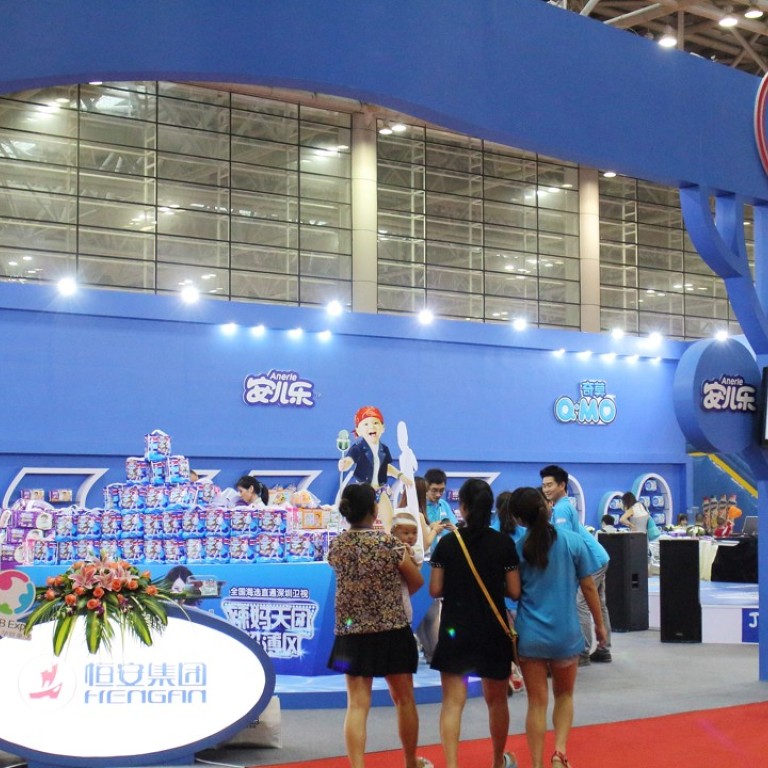
Hengan International shares plunge in Hong Kong after short seller brands it ‘worthless’
- China’s largest sanitary towels and baby nappies producer accused by Bonitas Research of fabricating income
- Hengan has no immediate response but says, ‘The company is operating as usual’
Trading in the stock of Hengan International Group Co., China’s largest sanitary towels and baby nappy producer, was suspended after a short seller’s report that branded the shares “worthless” caused them to plunge in Wednesday trading.
Bonitas Research, an Austin, Texas-based short-selling institution, claims Hengan International has fabricated a total of 11 billion yuan (US$1.6 billion) of net income since 2005 that is now reflected as fake cash on its balance sheet. It released the report on Wednesday morning.
Shares of the company had dropped as much as 8.8 per cent before settling at 5.7 per cent, when the trading halt was called.
The company has orchestrated a scheme “using a web of inter-company related transactions to artificially inflate profits and conceal fake cash balances”, and firm insiders have pocketed at least 7.8 billion yuan from dividends, the report said.
The value of the stock is ultimately zero because it has taken on a staggering amount of debt, the report said.
Hengan International declined to respond to the report immediately when a spokeswoman in Hong Kong was approached.
“The management has only just read the report and we do not have a response immediately,” said the spokeswoman, who declined to be named. “The company is operating as usual.”
In a subsequent phone call, another spokeswoman based in Hong Kong said the company plans to put out a statement later.
Bonitas Research plans to publish reports targeting two more Chinese companies listed in Hong Kong and the US respectively over the next two months, Matthew Wiechert, a short selling veteran who founded the organisation in March said in an earlier interview with the South China Morning Post.
“These are blatant frauds,” Wiechert said of the Chinese companies that he will next focus on. “These are all situations where it’s either fake revenues, fake profits, fake office, fake cash, fake PP&E [property, plant, and equipment], and insiders absconding with assets from the public company at the expense of shareholders.”
Since its founding in March, Bonitas Research has taken aim at two Hong Kong-listed companies that are based in China.
On September 13, Bonitas published a report accusing Chinese online lender Chong Sing Holdings FinTech Group of carrying out “sham transactions” and “artificially inflating financial performance”, making its stock worthless. The company’s shares have fallen off a cliff since then, dropping 62 per cent as of Wednesday when they were trading at HK$0.17, from HK$0.45 before the report.
Chong Sing has denied the accusations.
Shares of Hosa International, a Chinese sportswear maker headquartered in the southeastern province of Fujian, have been suspended from trading since September, after Bonitas accused the company of inflating profits fraudulence in July. The stock had plunged in June due to a sell-off by banks that held the shares as collaterals to the company’s loans, according to Bonitas.
Hong Kong’s stock exchange in November ordered the trading suspension to remain until Hosa addresses the allegations made by Bonitas.
Before Bonitas, Wiechert co-founded short selling institution Glaucus Research Group in 2011 with Soren Aandahl, who has also founded a separate operation, named Blue Orca Capital, since the two parted ways nine months ago.
Glaucus had targeted 11 Hong Kong-listed companies on top of stocks listed in New York, Australia, Taiwan and Singapore. One of its most famous assaults is China Metal Recycling, which was once the country’s leading recycler of scrap metal. Glaucus said in 2013 that the company lied about the size of its business and was a fraud. China Metal Recycling was delisted from Hong Kong in 2015 for “obtaining its initial listing by fraud”.

